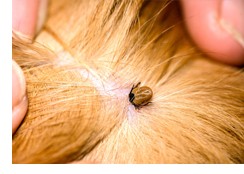
Is your pet up-to-date with a thorough routine of external parasite prevention? Depending on your dog or cat’s home environment and lifestyle, common parasites that could hitch a harmful ride on your pet include fleas, paralysis ticks, brown ticks and mites, such as sarcoptes.
What symptoms do external parasites cause?
Fleas most commonly cause itchiness, which can lead to significant skin irritation and infection in pets who are allergic to flea bites. Heavy infestations of fleas in puppies, kittens or very old pets can also cause anaemia and weakness, due to blood loss.
Paralysis ticks, found on Australia’s eastern seaboard, cause progressive muscle weakness, which can sadly be potentially fatal for pets. Symptoms of tick paralysis include leg weakness (that progresses to an inability to stand up), increased breathing effort, a change in bark/meow and sometimes vomiting or regurgitation.
Unfortunately, brown dog ticks can carry the bacterial disease ehrlichiosis and pass it to dogs that they attach to. Ehrlichiosis can cause weakness, weight loss, abnormal bleeding tendencies and organ damage that can prove fatal. Cases of ehrlichiosis are increasing, and have now been confirmed in areas of Western Australia, the Northern Territory and South Australia.
Mites, such as sarcoptes, can be passed from wild dogs, foxes, wombats or dingoes to pet dogs and cats. Sarcoptes cause mange symptoms, involving severe skin itchiness that can progress to hair loss and skin infection.
How can I prevent my pet from suffering from external parasites?
There are various parasite prevention options available including tablets, chews, topical drops and repellent collars, and our veterinary team can provide further advice specific to your pet.
Have a chat with a member of our Pet Doctors’ team for more personalised advice on how to keep those pesky parasites out of sight for your pet!
Find more interesting articles and Pet Doctors news on our Facebook and Instagram pages
If you would like to make a booking with us you can now book online!

